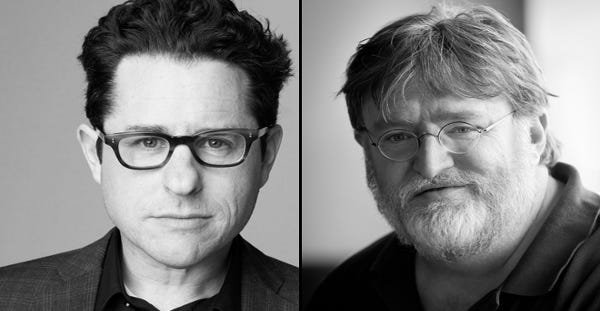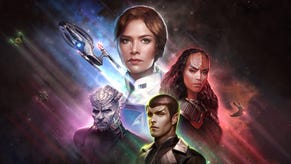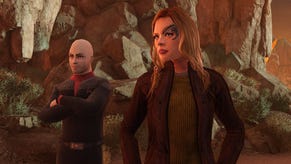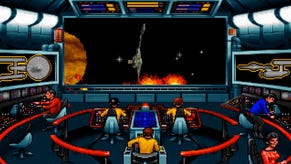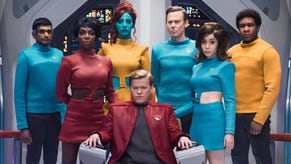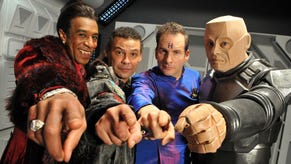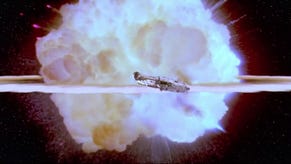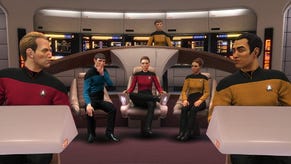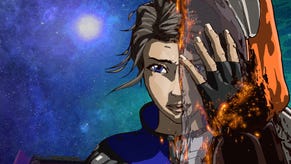D.I.C.E. 2013: Newell Vs Abrams - FIGHT!
"It's all about this illusion of freewill"
Some people talk. You know, with tongues and barbaric throat gurgles. Like peasants. But those people haven't conquered entire entertainment industries using titanic minds and the world's supply of lens flare alone. So naturally, Gabe Newell and JJ Abrams' verbal sparring match drew a bit more attention than the average bout of watercooler small talk. Also, it helps when the conversation involves the formation of a new creative superteam, a verbal fist-bump between two seismically powerful entities. But where exactly do they want to take their respective mediums? Where do they see eye-to-eye, and what are the biggest sticking points? Straight from DICE in Las Vegas, here's what Newell and Abrams chatted about.
The two began their mighty, spark-spattering brainclash for the ages by discussing film's obvious lack of interactivity. Newell aired a clip of Abrams' own Cloverfield, complaining that he just wanted the main character to toss the freaking camera and run for his life. Abrams, however, fired back with a clip from Half-Life 2, in which the player completely ignored the game's dramatic opening scenes in favor of hurling books at Barney's head and playing with a tiny teleporter. Further, he showed a rather flat early moment with Eli in which Gordon (naturally) didn't react in the slightest, noting that "players are often asked to imprint themselves and connect with and relate to insanely mute empty vessels. Characters that don't exhibit behavior in a way that you would. That can be just as frustrating [as not being able to control a movie character]."
Character setup then took center stage, with Abrams spotlighting seemingly pointless scenes from Jaws and Die Hard that ultimately played into the films' most pivotal moments. "I was really jet lagged once, and I remembered in Die Hard, John McClane was given advice. Someone said, 'When you get to places, rub your feet on the carpet. It helps you get rid of jet lag.' So I decided I'd try it. But as I was sitting in my hotel doing that, I realized the reason they did that is so he wouldn't have his fucking shoes on later and he'd step on glass. It was a complete setup. It had nothing to do with jet lag!" he said, laughing. Games, he argued, simply can't force players to endure seemingly meaningless moments like that.
Newell, however, countered with a Portal 2 clip in which the player wandered the moldy, overgrown remains of a science fair while Wheatley cracked jokes about potatoes. At the time, it seemed like a throwaway gag, but ultimately, it paved the way for the final act's potato battery. Newell further noted that players could take as much as they wanted from those scenes, too. They're self-directed, an element that movies can't hope to keep pace in, due to that whole "director" gig that's made JJ Abrams so much money lately.
So of course, Abrams replied by proving that Star Wars' R2-D2 is in Star Trek. No, seriously! He's floating around in a heap of space junk toward the film's end. Abrams' point was that easter eggs along those lines offer movie viewers a degree of agency, though he conceded that only a small subset of moviegoers ever seek them out.
"But," Newell interjected, "this is a point where we completely agree. Focus is super important. We had to spend a ton of time with the Portal 2 ending in order to make sure going to the moon was the obvious thing to do, and yet the player felt really creative for coming up with that as a solution. So we agree that when players are constantly trying to optimize, it's important to give them a focus that allows them to isolate on the variable we want them to optimize."
"In TV and movies too, it's all about this illusion of freewill," said Abrams. "We're always trying to hide the machinery. You're always leading people to critical moments that will add up and tell the story. I think it's a harder thing in games, frankly. One of the things movies can do is set things up in a way that makes you deeply care."
"Because if you don't care about the characters, nothing matters. No explosion. No spaceship flying. These things will not matter to anyone at all if you don't tell a good story."
Both proceeded to trade scenes: Abrams went back to Die Hard - presenting a moment of action-free, completely mundane chit-chat - while Newell played fetch with Dog in Half-Life 2. "So ostensibly, in gamer terminology, you're getting a new weapon and that's pretty exciting. But at the same time, we're telling you a lot about Alyx. Her relationship with her father, that she grew up somewhat lonely, that she's a little bit playful. And all this is coming through while you're getting this cool new weapon. So I think we agree that both games and movies take advantage of the power of discovery and mystery."
And then they started talking about how much they liked each others' works, which led to this exciting exchange:
"What we're actually doing here," Newell said, "is recapitulating a series of conversations that have been going on [between Abrams and I]. This is what happens when game and movie people get together. And we sort of reached the point where we decided that we needed to do more than talk. So we're gonna try and figure out if we can make a Portal movie or a Half-Life movie together." Meanwhile, Abrams added: "And we have a game idea we'd like to work with Valve on."
"It's time for our industries to stop talking about potential and really execute on it," Newell concluded.
